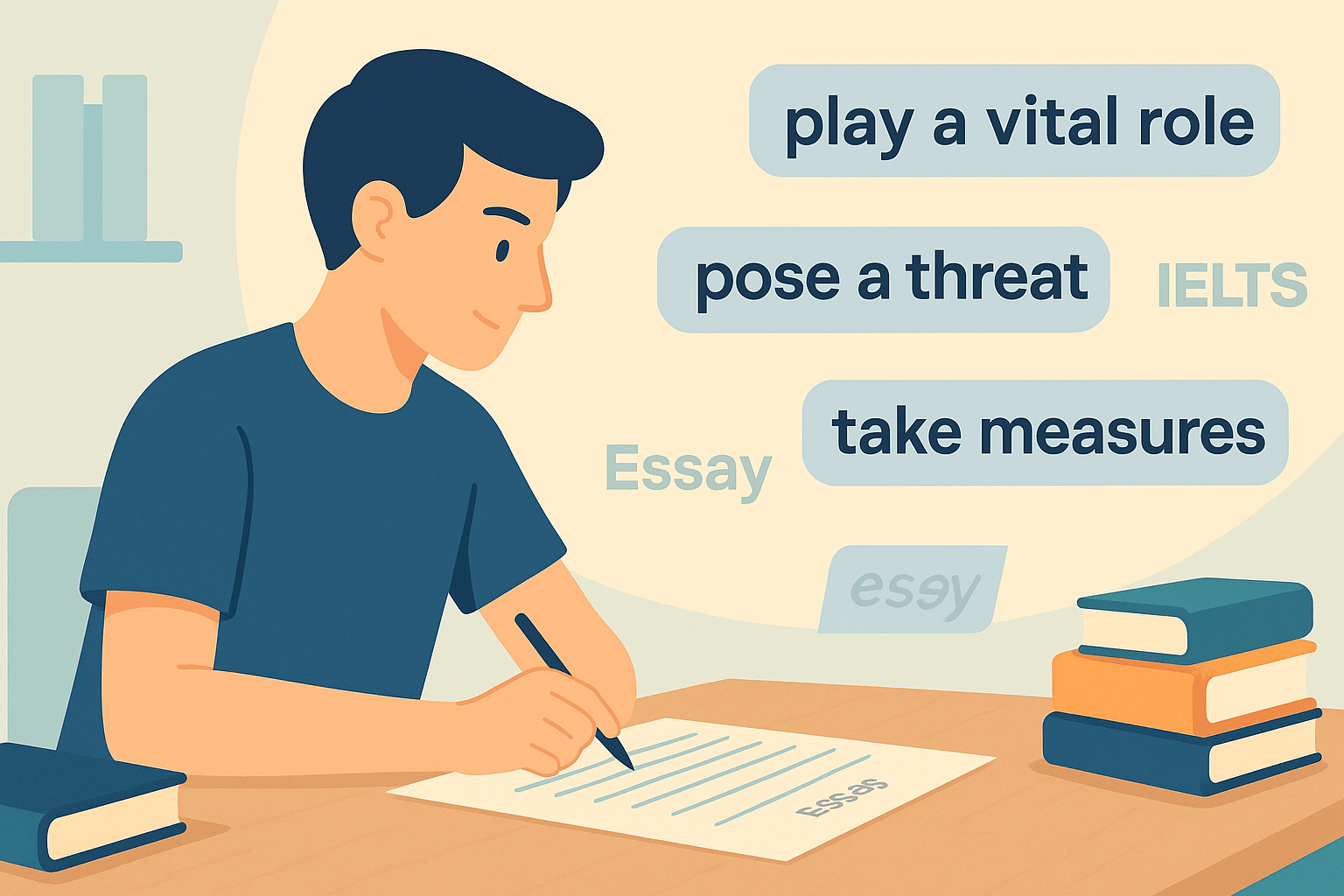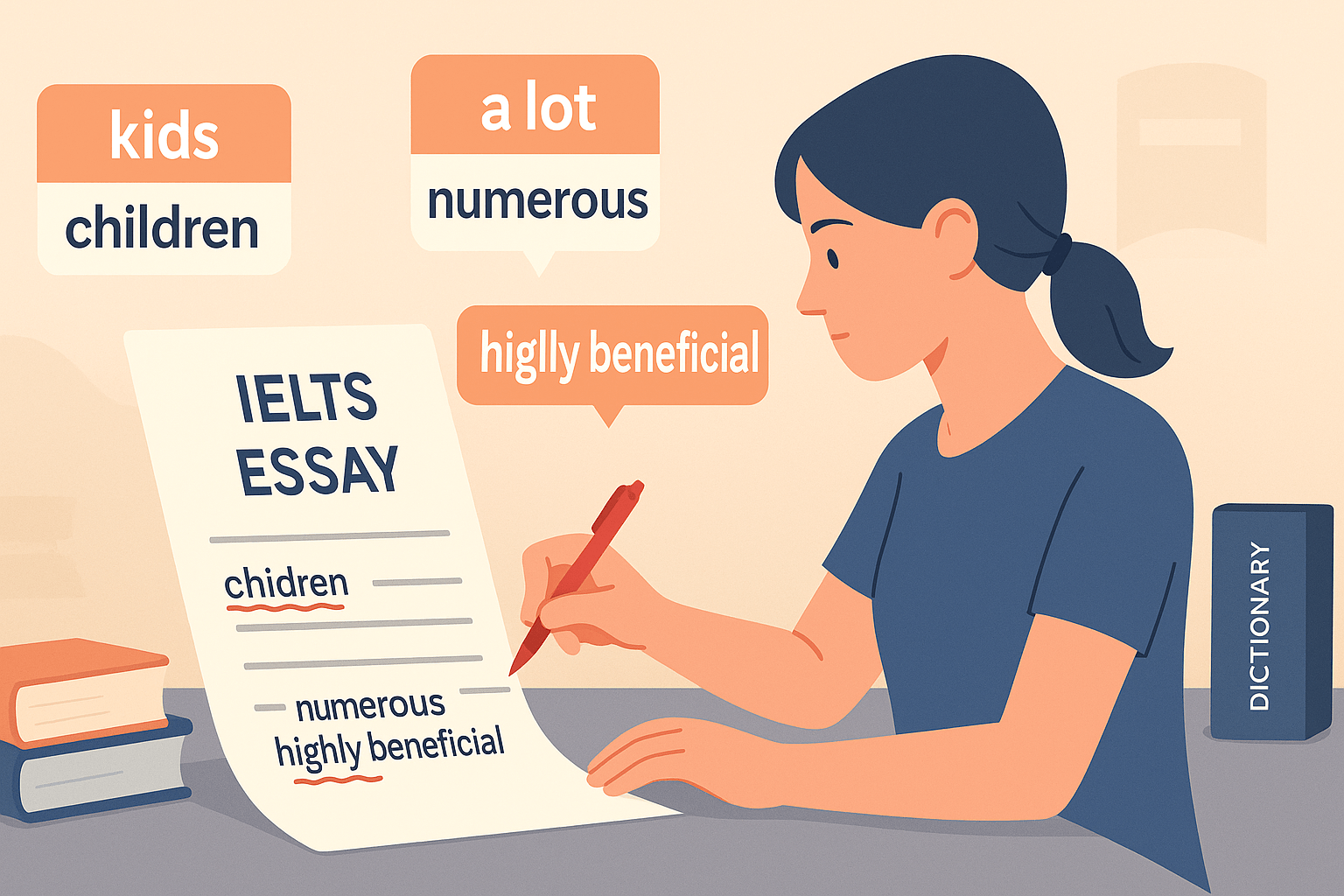When my IELTS students face a discussion essay question (also called Discuss Both Views), they often ask:
“How can I present both sides formally without sounding repetitive or informal?”
The secret is using IELTS discussion essay vocabulary—academic words, neutral connectors, and Band 9 expressions that help you:
- ✅ Present both viewpoints clearly
- ✅ Maintain a formal and balanced tone
- ✅ Show the examiner your lexical range and cohesion
This guide shares ready-to-use discussion essay vocabulary, plus my teacher tips to help you sound like a Band 7–9 candidate.
Before we begin, I recommend reading my IELTS Writing Task 2 Vocabulary for Band 7–9. It’s the pillar resource for all academic phrases you’ll need for Task 2.
Why IELTS Discussion Essay Vocabulary Matters
Discussion essays require you to present both sides objectively and give your own opinion (unless the question only asks you to discuss).
Examiners are looking for:
- Balanced presentation of ideas
- Clear transitions between viewpoints
- Formal and cohesive expressions
Without the right vocabulary:
- Your essay can feel one-sided or informal
- You may overuse simple words like “but” or “and”
- Your Coherence and Lexical Resource scores may drop
For official scoring criteria, refer to:
Essential IELTS Discussion Essay Vocabulary
Here’s my teacher-approved list of academic expressions for Discuss Both Views essays, organized by purpose.
1. Phrases for Introducing the Topic
Start your essay by paraphrasing the question and signaling a balanced discussion:
- It is often argued that… while others believe that…
- There are differing opinions regarding…
- Some people support the idea that… whereas others think that…
- The issue of … has sparked considerable debate…
Example:
“It is often argued that university education should be free for all, while others believe that students should contribute to the cost.”
2. IELTS Discussion Essay Vocabulary for Presenting Both Views
When presenting View 1, use:
- Some people argue that…
- Proponents of this view claim that…
- It is often said that…
When presenting View 2, use:
- On the other hand, others believe that…
- Opponents of this idea suggest that…
- Conversely, some argue that…
Example:
“Some people argue that online learning is more flexible and accessible. On the other hand, others believe that traditional classrooms provide better social interaction.”
3. Neutral Connectors and Cohesive Devices
Neutral connectors ensure your essay flows smoothly:
- For contrast: however, on the other hand, in contrast, conversely
- For balance: while, whereas, although, nevertheless
- For continuation: furthermore, in addition, moreover
Example:
“Traditional classrooms provide face-to-face interaction. However, they may lack the flexibility that online education offers.”
4. Evaluation and Analysis Words
To evaluate both sides and sound academic, use:
- significant, notable, crucial, essential
- advantage, disadvantage, drawback, benefit
- perspective, viewpoint, standpoint, argument
Example:
“One significant advantage of renewable energy is its positive impact on the environment.”
5. Phrases for Giving Your Own Opinion in a Discussion Essay
After discussing both sides, clearly state your stance:
- After considering both views, I strongly believe that…
- While both perspectives have merit, I am convinced that…
- In my view, the advantages of … outweigh the disadvantages.
Example:
“While both methods of education offer benefits, I strongly believe that online learning provides greater flexibility for working students.”
Teacher Tips for Using Discussion Essay Vocabulary
I’ve graded countless essays, and these are the top tips for Band 7–9 writing:
1. Keep a Neutral Tone Before Your Opinion
When discussing each view:
- Do not use emotional or casual language
- Avoid bias until your opinion paragraph
2. Vary Your Vocabulary
- Don’t repeat “some people think” in every paragraph
- Use synonyms and academic variations like advocates argue, supporters claim, opponents contend
3. Combine with Linking Words for Cohesion
Opinion vocabulary alone isn’t enough.
- Use linking words to transition smoothly
- Example: “Some people argue that public transport is efficient. However, others believe private cars are more convenient.”
Sample Paragraph Using IELTS Discussion Essay Vocabulary
“Some people argue that working from home increases productivity because employees can avoid commuting and create a comfortable workspace. However, others believe that remote work reduces collaboration and may lead to social isolation. While both perspectives have merit, I believe a hybrid work model balances productivity with team interaction.”
Notice how the paragraph:
- Presents both sides neutrally
- Uses neutral connectors and formal expressions
- Ends with a clear personal stance
Quick Practice Exercise
Rewrite this informal sentence into a formal discussion essay style:
“Some think fast food is bad, but others like it because it’s easy.”
Suggested Answer:
“Some people argue that fast food has detrimental effects on health, whereas others believe it is convenient and suitable for busy lifestyles.”
FAQ Section
Q1: How can I start an IELTS discussion essay?
Start with a neutral introduction using phrases like “It is often argued that…” or “There are differing opinions regarding…”.
Q2: What is the best IELTS discussion essay vocabulary to present both views?
Use formal phrases like “Some people argue that…”, “On the other hand…”, and neutral connectors like “however” and “whereas”.
Q3: Should I give my opinion in a discussion essay?
Yes, unless the prompt says otherwise. Present both views first, then state your opinion clearly in the conclusion or final body paragraph.
Conclusion
Using IELTS discussion essay vocabulary helps you:
- Present both views objectively
- Maintain cohesion and formal tone
- Achieve higher scores in Lexical Resource and Coherence
When you:
- Use neutral connectors and academic expressions
- Present balanced analysis
- End with a clear and formal opinion
… you are writing like a Band 7–9 candidate.
🔗 Next: Combine these phrases with our IELTS Writing Task 2 Vocabulary for Band 7–9 to maximize your score.





